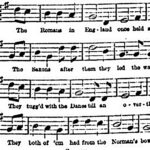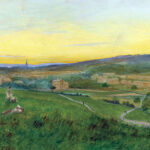3 August 1846: Aged one month, Frances Jane Campbell becomes the latest Leeds victim of the opiate epidemic
Leeds Mercury. 1846/08/08. Another child killed by an opiate. Leeds. Get it:
.Unedited excerpt
If an excerpt is used in the book, it will be shorter, edited and, where applicable, translated.
On Wednesday last, an inquest was held before Mr. Blackburn, coroner, at the Leeds Court-house, on view of the body of Frances Jane Campbell, aged one month, the daughter of Hugh Campbell, a labourer, residing in Back York-street. The deceased child, according to the evidence of its mother, was poorly, and apparently suffering pain in the abdomen, on Monday evening, and having heard that laudanum was a good thing to be administered in such cases, she sent her niece, a girl about nine years of age, to the shop of Mr. Ward, druggist, in Kirkgate, for a pennyworth of laudanum. Mr. Ward was in bed at the time, but the laudanum was served to the girl, who had taken a cup for it, by his son, a young boy, who told the girl in answer to a question from her, that not more than a drop ought to be given to a child so young as a month, and that laudanum was poison. Notwithstanding that the girl told her aunt that the boy said she was not to give the child more than a drop, she gave it a tea spoonful. Immediately after swallowing the laudanum, the child began to gasp for breath, and fell into a stupor. She immediately took it to Mr. Radcliffe, surgeon, and every available means was used to preserve its life, but it died on Tuesday morning about eight o’clock. The case was thoroughly investigated by the coroner and a respectable jury, and terminated in a verdict to the effect that the deceased died from the effects of laudanum incautiously administered. The mother of the deceased child was severely reprimanded for her grossly careless conduct, which appeared to have arisen from her own ignorance of the fact that laudanum is a poison, and from her forgetfulness that she ought not to give the child more than a drop. Her forgetfulness appeared to have arisen from her being irritated at the time through “fratching” (quarrelling) with her sister, who, as well as the father of the child, was in the house at the time, but neither of whom were sober. The Coroner made some judicious remarks on the evils – the deaths of scores, perhaps hundreds, of children and others – from the sale of opium, laudanum, “Child’s cordial,” and other poisons, by druggists and shopkeepers; and he said he felt it to be his duty to make a representation to the Home Secretary on the subject, to see if the Government would not take some step to prevent the common sale of poisons.
Comment
Comment
Here’s York Street, but where’s Back York Street? I know about the 1926 Rolleston Report, which inaugurated strict regulation, but were there any controls in the 1840s? The immediate and long-term dangers of laudanum for infants (and others) were well-known to those who could have made a difference. Here’s a rhyme from a 25-year-old nurse’s manual:
RESTLESS NIGHTS
When a babe is uneasy and restless in bed,
“Child’s cordial” will soothe it to sleep, it is said;
And ignorant people, who know not its harm,
Think this dangerous stuff has a powerful charm.
But one drop of such poison I never will give,
Because I would rather my darling should live;
And I know very well, if this cordial I try,
That baby will want more and more, till it die.
Tho’ made with such art as to lull and give ease,
It lays the foundation for lasting disease:
No mother deserves a sweet babe for her prize,
Who would poison her infant, to silence its cries;
And a nurse who loves baby, or values her place.
Will ne’er use this drug; ’tis a sin and disgrace.
Well then, I will try with much patience and care,
To soothe by dear babe, or some food to prepare;
And the true satisfaction of doing my best,
Will repay all my labour and sweeten my rest.
(Arthington 1820ish)
One recalls a 19th century(?) “epitaph on a child six weeks old“:
I wonder what I was begun for,
Since I was so soon done for.
(Mathews Jackson 1839)
Something to say? Get in touch
Similar
 25 September 1880: Thomas Harper reveals to the Leeds Mercury’s young readers a mnemonic song of monarchs (except Oliver) used in the village school at Weldrake (York) in the 1770s
25 September 1880: Thomas Harper reveals to the Leeds Mercury’s young readers a mnemonic song of monarchs (except Oliver) used in the village school at Weldrake (York) in the 1770s 30 May 1835: Alfred Austin, future poet laureate, “Banjo-Byron that twangs the strum-strum,” is born into rural splendour at Ashwood, 48 Headingley Lane, Leeds
30 May 1835: Alfred Austin, future poet laureate, “Banjo-Byron that twangs the strum-strum,” is born into rural splendour at Ashwood, 48 Headingley Lane, Leeds
Comment
Comment
Although a brief search didn’t throw up the date for 1874, other mentions in the period suggest that the Pateley races were held on the penultimate Monday of September – the 21st in 1874 – and in corroboration the first (rugby) football match in Nidderdale was held on this day at Pateley Bridge between Harrogate and Pateley and district. Re the 1877 feast:
The weather was fine, and though threatening clouds hung about during the morning, the country people turned out in strong force. There was a large contingent of pleasure seekers from Harrogate and other towns within easy reach of Pateley Bridge, which is approached by a single line from Harrogate, and the trains were crowded to excess. Hence the one narrow street which gives the appellation of Town to Pateley Bridge was thronged long before the sports were to commence, but the people who flocked in from the surrounding villages found plenty of amusement. Bands of music paraded the town, and an itinerant nigger band excited the greatest admiration of their rural audience. The races, which were the chief item in the afternoon’s programme, were held in a field on the side of the river Nidd, and close to the town, and there was a very large company present. The entries for the various events were larger than on any previous occasion. Each event was run in heats, and though the proceedings can hardly be dignified by the name of sport, yet the contests produced much amusement. There were several gentlemen who might by way of compliment be called bookmakers present, but their offers were of the most illiberal description. The betting is, of course, not quotable, though there was a good deal of wagering for small money on the various races.
(York Herald 1877/09/25)
Something to say? Get in touch
Search
Donate
Music & books
Place-People-Play: Childcare (and the Kazookestra) on the Headingley/Weetwood borders next to Meanwood Park.
Music from and about Yorkshire by Leeds's Singing Organ-Grinder.


 Bluesky
Bluesky Extwitter
Extwitter